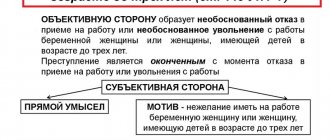Types of legal liability and grounds for bringing the police department and investigative authorities to it
Employees of the Department of Internal Affairs can take part in tax authorities’ control operations and inspections if they are involved in the case by sending an appropriate request.
If representatives of the Department of Internal Affairs commit illegal actions during the implementation of control and verification activities, the violators are brought to various types of legal liability.
Types of responsibility of internal affairs bodies for unlawful actions and criminal inaction of their employees during the performance of official duties:
- disciplinary;
- administrative;
- civil law;
- material;
- criminal
Tasks of officials
It is worth considering the work of officials in identifying offenses using the example of the Department of Internal Affairs. It is this authority that carries out most of the functions in the field of crime prevention and suppression. Cases of the following nature are being considered:
- violation of the rules of stay at the state border;
- appearing in public places while drunk;
- petty hooliganism;
- drinking alcohol in public places;
- violation of road safety rules, etc.
The power of the Department of Internal Affairs affects many spheres of public life, but it is not unlimited. It is also worth noting that actions and inactions of an official that do not comply with the law can be identified and condemned by another official.
Grounds for bringing police officers and investigative bodies to disciplinary liability
The grounds for bringing officials to disciplinary liability are direct violation of official procedures and neglect of duties, that is, disciplinary measures are applied in case of non-compliance with the rules of official discipline.
The general procedure for bringing officials to this type of responsibility, as well as the grounds for imposing a disciplinary sanction, are regulated by the Labor Code of the Russian Federation.
The actual disciplinary offenses, in the presence of which it is permissible to bring a person to the appropriate legal liability, are provided for by special acts of lawmaking. So, for representatives of internal affairs bodies these are:
1. Law “On the Police”;
2. Relevant provisions.
For committing disciplinary offenses, the following types of punishments are imposed on employees of internal affairs bodies:
- issuing a reprimand;
- issuing a severe reprimand;
- warning;
- reduction in rank of the official who committed the offense;
- demotion of the offender;
- deprivation of a badge;
- The extreme disciplinary measure is dismissal.
The necessary amount of authority to impose a disciplinary sanction on a police officer is granted only to the official who has the right to accept citizens for a certain position.
Offenses by officials
The “special part” of the Russian Administrative Code contains 442 articles. Of these, 330 are devoted to the responsibility of officials—that’s almost three quarters. Most of the articles are devoted to the entrepreneurial and organizational and economic activities of citizens. It is worth highlighting offenses in the following areas:
- encroachment on civil rights (50 articles from Chapter 5 of the Code of Administrative Offenses of the Russian Federation);
- protection of property (29 articles from Chapter 7 of the Code of Administrative Offenses of the Russian Federation);
- ecology, environmental management and environmental protection (38 articles from Chapter 8 of the Code of Administrative Offenses of the Russian Federation);
- agriculture, land reclamation and veterinary medicine (14 articles from Chapter 10);
- communication and information (23 articles from Chapter 13 of the Code of Administrative Offenses of the Russian Federation);
- industry, energy and construction (14 articles from Chapter 9);
- finance and taxes, as well as business activities (59 articles from chapters 14 and 15);
- customs sphere (21 articles from Chapter 16);
- encroachment on government bodies of the Russian Federation (10 articles from Chapter 17);
- military registration (4 articles from Chapter 21);
- management order (19 articles from Chapter 19).
Thus, the responsibility of officials in the Code of Administrative Offenses is provided for almost everywhere.
Grounds for bringing officials to administrative responsibility
The basis for imposing an administrative penalty is the commission of an administrative offense by an official. This norm is enshrined and guaranteed by the Code of Administrative Offenses of the Russian Federation.
Types of offenses that entail prosecution and the concomitant application of administrative penalties:
- failure to perform or improper performance of official duties;
- committing unlawful actions or inaction, which resulted in a violation of the legal rights of citizens;
- refusal of an internal affairs officer to consider a citizen’s application or accept a document;
- violation of the procedure for considering citizens' applications, as well as failure to meet deadlines;
- making an unfounded decision that caused harm to a citizen.
The presented list of offenses is not exhaustive.
A full list of grounds, as well as the procedure for bringing officials to administrative responsibility, are set out in the Code of Administrative Offenses of the Russian Federation.
As a rule, the main measure of administrative punishment against officials is the application of penalties, the amount of which depends on the severity of the offense committed, as well as on other factors that are important in determining the punishment (repetition, amount of damage caused by the offense, etc.) .
Article 2.4 of the Code of Administrative Offenses of the Russian Federation. Administrative responsibility of officials (current version)
The fact that, according to the job description, the duties of Zhuravleva A.K. includes representation of the interests of the organization in bankruptcy cases, including correspondence with arbitration managers, representatives of the temporary administration, does not indicate that it is endowed with any organizational, administrative or administrative functions. The responsibilities of the leading legal adviser of the claims department of the corporate legal department of the organization, as provided for in the job description, are not individual and are established for many employees of the department.
On this basis, the Supreme Court of the Russian Federation recognized the evidence cited by A.K. Zhuravleva. arguments are sufficient grounds for reviewing the appealed judicial acts in cassation (Decision of the Supreme Court of the Russian Federation dated May 24, 2017 N 305-AD17-1484 in case N A40-91243/2016).
Also, persons not vested with organizational-managerial or administrative-economic functions, working in an organization or for an individual entrepreneur (for example, sellers, cashiers), can also be brought to administrative responsibility as citizens in connection with their commission of offenses provided for in Articles 14.2, 14.4 , 14.7, 14.15 Code of Administrative Offenses of the Russian Federation (clause 14 of the Resolution of the Plenum of the Supreme Court of the Russian Federation of October 24, 2006 N 18 “On some issues that arise for courts when applying the Special Part of the Code of the Russian Federation on Administrative Offences”).
When determining an official who is subject to administrative liability, three approaches are used. How officials bear responsibility:
1) managers and other employees of other organizations, arbitration managers who have committed administrative offenses in connection with the performance of organizational, administrative or administrative and economic functions are liable as officials, regardless of what administrative offense provided for by the Special Part of the Code of Administrative Offenses of the Russian Federation they committed;
2) persons carrying out entrepreneurial activities without forming a legal entity are liable as officials, only unless otherwise directly provided for by the Code of Administrative Offenses of the Russian Federation. So, for example, in accordance with Part 1 of Art. 14.3.1 of the Code of Administrative Offenses of the Russian Federation, sponsorship of tobacco or promotion of the sale of tobacco, tobacco products or tobacco products and (or) tobacco consumption, with the exception of cases provided for in parts 2 and 3 of the same article, entails the imposition of an administrative fine on citizens in the amount of two thousand to three thousand rubles; for officials - from five thousand to fifteen thousand rubles; for legal entities - from eighty thousand to one hundred and fifty thousand rubles. An individual entrepreneur who has committed an administrative offense under Part 1 of Art. 14.3.1 of the Code of Administrative Offenses of the Russian Federation, will be held liable as an official (that is, a fine in the amount of five thousand to fifteen thousand rubles may be imposed on him). On the contrary, for example, part 2 of Art. 7.23.3 of the Code of Administrative Offenses of the Russian Federation establishes liability for failure to fulfill the obligations provided for by the rules for carrying out business activities for the management of apartment buildings, during the period of termination of the license to carry out business activities for the management of apartment buildings or its cancellation in the amount - for officials in the amount of one hundred thousand to two hundred thousand rubles or disqualification for up to three years; for individual entrepreneurs - from one hundred fifty thousand to five hundred thousand rubles or disqualification for up to three years; for legal entities - from one hundred fifty thousand to five hundred thousand rubles. In this case, an individual entrepreneur who committed an administrative offense under Part 2 of Art. 7.23.3 of the Code of Administrative Offenses of the Russian Federation, will be held liable not as an official, but as an individual entrepreneur, since this is directly stated in the sanctions of this article;
3) members of boards of directors (supervisory boards), collegial executive bodies (boards, directorates), counting commissions, audit commissions (auditors), liquidation commissions of legal entities and heads of organizations exercising the powers of sole executive bodies of other organizations, individuals who are founders ( participants) of legal entities, heads of organizations exercising the powers of the sole executive bodies of organizations that are founders of legal entities; persons performing the functions of a member of the commission for the procurement of goods, works, services to meet state and municipal needs, contract managers, contract service employees; persons performing the functions of organizing and carrying out procurement in accordance with the legislation of the Russian Federation in the field of procurement of goods, works, services by certain types of legal entities, including members of the procurement commission; persons performing the functions of a member of the licensing commission; persons performing the functions of organizing and conducting mandatory tenders in accordance with the legislation of the Russian Federation, including members of the competition commission, auction commission, are liable as officials only in cases of committing administrative offenses directly provided for in the note to the commented article.
EXAMPLE.
The Supreme Court of the Russian Federation upheld the Resolution of the judge of the Abakan City Court of the Republic of Khakassia dated 04/16/2015 N 5-1057/2015, the decision of the judge of the Supreme Court of the Republic of Khakassia dated 07/31/2015 N 7p-42/2015 and the Resolution of the Deputy Chairman of the Supreme Court of the Republic of Khakassia dated 10.16.2015 N 7н-151/2015, issued against the deputy general director of the limited liability company "Siberian Generating Company" - director of the Abakan branch of the said company O.V. Petrova. in the case of an administrative offense provided for by Part 1 of Article 14.6 of the Code of the Russian Federation on Administrative Offences, indicating, in particular, that, contrary to the arguments of the complaint, O.V. Petrov, the head of the Abakan branch of the company, which is the sole executive body of the company, is the proper subject of the sane him an administrative offense, since by virtue of the note to Article 2.4 of the Code of the Russian Federation on Administrative Offences, those who have committed administrative offenses in connection with the performance of organizational and administrative or administrative and economic functions are managers and other employees of other organizations, arbitration managers, as well as those who have committed administrative offenses provided for in articles 9.22, 13.25, 14.24, 14.25, 14.55, 14.56, part 3 of article 14.57, art. Art. 14.61, 14.63, 14.64, 15.17 - 15.22, 15.23.1, 15.24.1, 15.25, 15.26.1, 15.26.2, 15.29 - 15.31, 15.37, 15.38, part 9 of article 19.5, articles 19.7. 3, 19.7.12 Code of Administrative Offenses RF, members of boards of directors (supervisory boards), collegial executive bodies (boards, directorates), counting commissions, audit commissions (auditors), liquidation commissions of legal entities and heads of organizations exercising the powers of sole executive bodies of other organizations bear administrative responsibility as officials (Resolution of the Supreme Court of the Russian Federation dated March 18, 2016 N 55-AD16-2).
Also, other administrative penalties may be imposed on officials, in particular disqualification, confiscation of the instrument or subject of the administrative offense.
Civil and financial liability of officials
Unlawful actions or inaction of officials of both internal bodies and investigative bodies, as a result of which damage was caused to citizens, are grounds for bringing the offender to civil liability.
Features of bringing officials to material and civil liability:
- compensation for damage is carried out at the expense of funds from the state budget, and the official is held liable;
- the violator, who is an official, is not liable to persons affected by his unlawful action or inaction, since, according to the law, officials are not included in the number of subjects of civil legal relations;
- compensation for damage caused by illegal actions of an official occurs in the manner established by the Civil Code of the Russian Federation;
- bringing an official to financial responsibility does not exclude the possibility of imposing an administrative penalty on him or applying disciplinary punishment.
About the status of an official
Who is an official under the Code of Administrative Offenses of the Russian Federation? This question can be answered, but only by first determining the status of the person. To do this, it is necessary to pay attention to the legal regulation of assigned powers. Moreover, the status does not depend on the objective implementation of the functions performed.
An official has the right to exercise the rights entrusted to him or to refrain from them. However, a citizen cannot refuse his duties. Thus, in this area an equal ratio of imperative and dispositive principles prevails. In administrative law, it is possible to identify private and public activities that fall under the jurisdiction of an official. It should be noted that such identification is possible only in the field of administrative law. Thus, in the criminal sphere, a person has the opportunity to exercise only public powers.
Criminal liability of employees of internal affairs bodies and officials of investigative bodies
Criminal liability occurs when an official commits unlawful actions, which occurred through the use of powers vested in the offender by virtue of his official position. An official is a special subject of a crime.
There are several groups of crimes for the commission of which it is possible to bring an official to criminal liability:
- criminal acts, the object of which is the inviolability of state power, as well as the interests of the civil service;
- criminal acts against justice;
- socially dangerous actions or inactions, the object of which are the rights, interests and freedoms of citizens.
Unlike other types of legal liability, criminal liability is allowed only on the grounds provided for by the Criminal Code of the Russian Federation.
The use of other legal acts when assigning punishment, as well as the use of analogies of law, is unacceptable.
Author of the article
Concept of an official
A Russian citizen performing the functions of a government representative is called an official. Moreover, power does not necessarily have to be state power. A person can acquire the status in question by occupying a senior position in a public institution, party, enterprise or even in a production organization. In most cases, the functions that an official performs are closely related to administrative, economic and organizational activities.
There are several definitions of the concept “official”. The Code of Administrative Offenses of the Russian Federation states that an individual has committed an administrative offense. The Criminal Code of the Russian Federation refers to a criminal offense, and the Civil Code of the Russian Federation refers to civil legal relations. If we look at the concept through the prism of the Russian elite, then we are talking about a representative of a government body of the Russian Federation. Next we should consider the definition provided by the Russian Administrative Code.
Lawyer for administrative charges in Yekaterinburg
Administrative matters are not as simple as they seem at first glance. In addition, this category of cases has its own specifics, so you should seek legal assistance from those lawyers who specialize in these cases.
In our Law Office “Katsailidi and Partners” there are lawyers, one of whose areas of activity is administrative law and, accordingly, issues of involvement in administrative matters.
By contacting our administrative lawyers, you can use the following services:
- receiving detailed advice on your issue related to involvement in administration
- studying the citizen’s documents related to your involvement in administration
- preparation of objections to involvement in administrative proceedings
- participation of a lawyer as your representative during the consideration of an administrative case
- preparation of a complaint against the act of bringing an individual to administrative responsibility
- collection, request for additional evidence of your innocence
- other legal assistance





